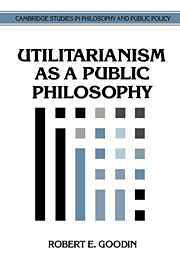2 - The state as a moral agent
Published online by Cambridge University Press: 28 January 2010
Summary
Positive arguments for state intervention of a broadly utilitarian sort face essentially two different foes within contemporary moral and political philosophy. On the one hand, there are libertarians opposed to state intervention of any sort as a matter of principle. To defeat their objections, the utilitarian needs to show there is a legitimate role for state action at all. On the other hand, the utilitarian fixation with securing good outcomes through social action is opposed by deontologists, who would judge all actions in terms of the inputs – specifically, in terms of the quality of the motives and intentions from which they proceed. Defeating these two sorts of opponents is the task of this and the next chapter, respectively, thus paving the way for the introduction (in Chapter 4) of my preferred form of “government house” utilitarianism.
The essentially antilibertarian argument of this chapter starts from the observation that individuals find all sorts of excuses for not doing the right thing. What follows is an analysis of how two such excuses cut across each other in some rather surprising ways. The failure of isolated individuals to do the right thing is excused, but only at the price of permitting (or perhaps even requiring) coordinated collective action wherein individuals may be rightly required to play their respective parts.
The analytic key to this argument is simply the proposition that the state is a moral agent, too.
- Type
- Chapter
- Information
- Utilitarianism as a Public Philosophy , pp. 28 - 44Publisher: Cambridge University PressPrint publication year: 1995
- 4
- Cited by

